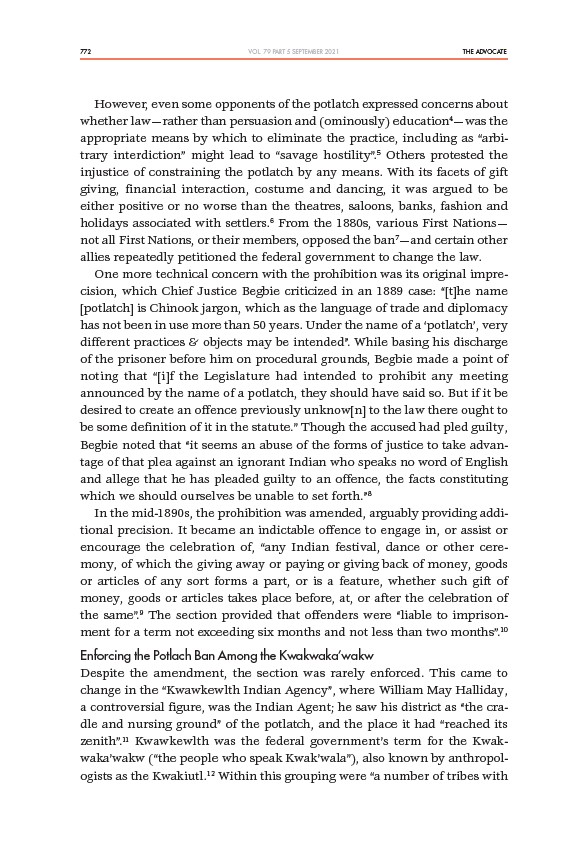
772 THE ADVOCATE
VOL. 79 PART 5 SEPTEMBER 2021
However, even some opponents of the potlatch expressed concerns about
whether law—rather than persuasion and (ominously) education4—was the
appropriate means by which to eliminate the practice, including as “arbitrary
interdiction” might lead to “savage hostility”.5 Others protested the
injustice of constraining the potlatch by any means. With its facets of gift
giving, financial interaction, costume and dancing, it was argued to be
either positive or no worse than the theatres, saloons, banks, fashion and
holidays associated with settlers.6 From the 1880s, various First Nations—
not all First Nations, or their members, opposed the ban7—and certain other
allies repeatedly petitioned the federal government to change the law.
One more technical concern with the prohibition was its original imprecision,
which Chief Justice Begbie criticized in an 1889 case: “the name
potlatch is Chinook jargon, which as the language of trade and diplomacy
has not been in use more than 50 years. Under the name of a ‘potlatch’, very
different practices & objects may be intended”. While basing his discharge
of the prisoner before him on procedural grounds, Begbie made a point of
noting that “if the Legislature had intended to prohibit any meeting
announced by the name of a potlatch, they should have said so. But if it be
desired to create an offence previously unknown to the law there ought to
be some definition of it in the statute.” Though the accused had pled guilty,
Begbie noted that “it seems an abuse of the forms of justice to take advantage
of that plea against an ignorant Indian who speaks no word of English
and allege that he has pleaded guilty to an offence, the facts constituting
which we should ourselves be unable to set forth.”8
In the mid-1890s, the prohibition was amended, arguably providing additional
precision. It became an indictable offence to engage in, or assist or
encourage the celebration of, “any Indian festival, dance or other ceremony,
of which the giving away or paying or giving back of money, goods
or articles of any sort forms a part, or is a feature, whether such gift of
money, goods or articles takes place before, at, or after the celebration of
the same”.9 The section provided that offenders were “liable to imprisonment
for a term not exceeding six months and not less than two months”.10
Enforcing the Potlach Ban Among the Kwakwaka’wakw
Despite the amendment, the section was rarely enforced. This came to
change in the “Kwawkewlth Indian Agency”, where William May Halliday,
a controversial figure, was the Indian Agent; he saw his district as “the cradle
and nursing ground” of the potlatch, and the place it had “reached its
zenith”.11 Kwawkewlth was the federal government’s term for the Kwakwaka’wakw
(“the people who speak Kwak’wala”), also known by anthropologists
as the Kwakiutl.12 Within this grouping were “a number of tribes with